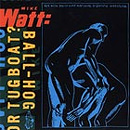 |
|
|
|
|
|
|
|
  ← Prev | 1 | 2 | 3 | 4 | Next → |
You mean like taking a style and making it more commercial?
Mike:Appropriating it. If communism was hip, they'd sell that. They have no problem. Believe me. They tried with The Clash wearing guerilla chic. Like I said, it's people's music. The real stuff is always gonna come from basements. And out of hearts and minds, and not from shopping malls. And I think, it's hard for kids to know that. Like I said, they are born and immersed in it, you know? But anybody who's been a little different, or beat down because they were kind of a misfit, they understand, very obviously, what it's about.
fIREHOSE released some great albums, then disbanded after moving to a major label. Did the break-up have anything to do with the indie spirit being influenced by a major record label?
Mike:No. Because the contract I signed was just like SST. I delivered finished tapes. They had no say in my records. I disbanded fIREHOSE. 7 and a half years. I was in fIREHOSE longer than in Minutemen. That's why. I thought it ran its course. It had nothing to do with the label. I made sure when I made that deal with Columbia that I would have the same freedom I did with SST. I was lucky. I was an SST guy for 11 years, and I had learned the game. I didn't take their money, I wanted freedom. Me and D. Boon came up with this theory that there's 2 categories. There's flyers, and there's gigs. Everything that's not a gig is a flyer. So a record is a flyer, a video is a flyer, this interview is a flyer ... it's to get people to the show. That's the philosophy. So we had no problem going to Columbia as long as I had a contract guaranteeing me artistic freedom. That means I didn't take much up-front money. None.
Like I said earlier, SST built the foundation for the alternative movement of the 90's. A lot of those alternative people actually played with you on the Ball-hog Or Tugboat? album. What did making an album with all of your admirers feel like?
Mike:With much respect to them. A lot of them didn't like what happened. They didn't like alternative. They were little kids when we were doing that stuff. And they wanted to play with somebody who was from there. I didn't want to make alternative music. I think that was jive. A lot of them ... they don't like what the industry did. The label was very surprised that I did that. But it was easy. I just called up people. I never used a manager. I don't think you can never rely on the industry to ever invent things. They could get some records in the store, but that's about it. Once you start relying on them, of course there's gonna be problems. You know? Like I said, I deliver finished tapes. The label's not involved in the execution and the creation. I do it like the old SST did. Exactly the same. I'm gonna record again this summer.
The Red Hot Chili Peppers dedicated their album "Blood Sugar Sex Magic" to you.
Mike:Oh yeah. Flea's an old friend. Their first, or second gig was the Minutemen. I think they did a fashion show first. But their second gig, yeah. So we share history. I was in Europe when I saw that, and that surprised me very much. I don't know what to say. But I've been influenced. John Fogerty. Richard Hell. Those bass players I was telling you about. I still am. J. Mascis. John Coltrane said one important thing. Well, he said many, but he said 'Music's like a reservoir.' Big thing of water. We're all drinking from it. Or pissing into it, I guess.
What was it like playing with Porno for Pyros?
Mike:That was the first time I worked for somebody. This is the second time. Only Perry and J. Mascis, really. It was something else. He helped me get the idea for this. Perry doesn't play. He's a singer. So when he shows you a song, he doesn't show you the chords, he tells you the story of the song. So I thought, maybe I should tell my story. That's where I got the idea. He's a very inspiring guy. I still play with Stephen Perkins all the time. He has a band called Banyan and I help him out everytime I can. We're lucky in L.A. We have a huge scene of people playing that are genuine, that aren't jive. There are jive ones too, but ... in a way I'm very lucky, you know? There's a lot of opportunity. I try to work as hard as I can at it. I mean, he had me wearing costumes! It was very strange, and people, again, like with the pick, were saying 'Why do you let him make you wear costumes?'. I said, 'Why not?'. See, because Mike Watt is this one image to people. Why use a pick? Why wear a costume? Why not? People just cannot get that free in their mind. They want you to be frozen. So that's a good reason to blow their minds.
As I said earlier, the music scene in the U.S. right now is kind of superficial, all teen idol groups and rap metal bands. Are there any new young bands that interest you?
Mike:Let me give you a little philosophy. If you want to be a good farmer, you use a lot of manure. You know what I'm saying? Things will grow out of this.
Oh, so this is the manure ...
Mike:The cycle has repeated itself several several times over history. I don't think it's the end of time. There are lots of great bands. This band here, Melt Banana, incredible band. Tokyo band. I played with them in Florida. That's why I met them. In the United States, right now, there are plenty of young bands, plenty of good labels too. It's easier to be a punk rocker now than in the old days, I think. To be creative. There's still a burden of you doing something. Not just dressing up. You have to go for it. And there are kids doing it. There are people very interested in the old days now, who want to know where it came from. Because they have no idea. MTV don't want to let them know. They want to keep it ... they don't want people taking things in their own hands. That's what it's about. Taking things in your own hands. Writing your own story. Painting your own painting. Who do I like right now? My mind ... this is always horrible for me. I'm out of touch. I can't remember the names.
Are they local bands?
Mike:They're all over. When I tour in the United States, I always play with local bands. Yeah, there are some good Los Angeles bands. Plenty of them. I just can't remember their names. I get too nervous in interviews. This is horrible. I wish I could tell you ... Believe me, there are plenty of them, and you shouldn't really have to have Mike Watt tell you. The only way to know is somehow they will come play for you. Plenty of good Japanese bands, too. Numbergirl, I could remember their name. I just forget, because these are nervous situations for me. I know I've come on like I'm very confident, but they are so scary for me.
You hide it very well.
Mike:Well, I've been doing it for many years. But I can't think of them. There are plenty of bands though, believe me. Healthy, healthy scene.
It's okay. Don't worry so much.
Mike:Okay. Do-mo. Oh, I just saw Le Tigre, I like them. I saw them in Tokyo. Kathleen Hanna. She's on here (Ball-hog), so I guess she's not so new.
She's from Bikini Kill.
Mike:Yeah, in fact I do 'Rebel Girl' in my set. I love that song. I just can't think of the names. I'm sorry though. There are plenty, believe me. My apologies.
Will you be doing more touring?
Mike:Oh yeah. J wants to do more United States right after this. we go to Australia tomorrow. Then United States. 6-7 more weeks. Then summer, I'm gonna make a record. And tour for me in fall. I like to tour in fall and spring. Weather's more calm. No swealter, no snow. This is my 42nd tour. 42 more. I really feel fortunate to do this. I want to keep going. This year, I'm going to make actually 4 records. I have a record with Kira from Black Flag, called Dos, where it's just 2 basses. Dos is Spanish for two. We made 3 albums, we're starting the 4th one.
So, this year you are making 3 solo albums?
Mike:This summer, first ... bass, organ, drums. And then, 2 power trios with guitar. That's what we call in the United States where it's just guitar, drums, and bass. We call those power trios. I don't know why. Like Cream. So, I'm gonna make 3 albums.
I'm confused. Your own solo album as Mike Watt this summer, then ...
Mike:Then in the winter I'm gonna make 2 Mike Watt ones, with 2 different line ups. This is what I've done since fIREHOSE, and why I stopped fIREHOSE. I don't have a band. I put groups of guys around projects. My oldest band, though, is Dos. The one with Kira from Black Flag. And it's just 2 basses. That's all. So it's pretty music. There's no drummer, no guitar.
The summer one is not a power trio?
Mike:It's with organ. Something new for me. No guitar. Organ, bass, drums. I think, to grow you have to constantly test yourself and experiment. And that will be for Sony Columbia. It'll be out in fall.
We'll be waiting for your next album, and I hope you come to Japan again for your solo project soon.
Mike:Yeah. You know, lying in that bed dying, I got all these ideas, all these songs. You understand, I have to record a lot. You never know when it's the end. But of course, I would love to come back. Believe me, it's quite an experience. And you ask some great questions, too.
Thank you very much.
Mike:Do-mo.
|
← Prev | 1 | 2 | 3 | 4 | Next → Special Issue | Interviews | Articles | Disc Reviews Core BBS | Easy Blog | Links © 2003 HARDLISTENING. all rights reserved. |